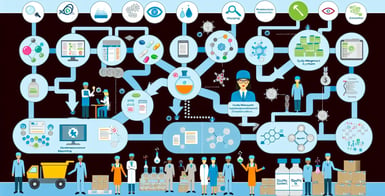Manufacturing Quality Management Systems
The role of a Production Scheduler is indispensable in pharmaceutical manufacturing where precision and compliance are vital. Ensuring seamless operations while adhering to stringent quality standards is a constant challenge. However, advancements in technology have opened avenues for streamlining processes and enhancing efficiency. One such avenue is the integration between Manufacturing Quality Management Systems (QMS) and Enterprise Resource Planning (ERP), Supply Chain Management (SCM), and Manufacturing Execution Systems (MES) platforms.
In this blog, we'll look into the significance of integrating QMS with production scheduling software, focusing on the benefits, challenges, and best practices. Moreover, we'll explore the potential of integrating PlanetTogether, a leading production scheduling tool, with prominent ERP, SCM, and MES systems like SAP, Oracle, Microsoft, Kinaxis, and Aveva, to optimize pharmaceutical manufacturing operations.

Understanding the Importance of QMS Integration
Quality is the cornerstone of pharmaceutical manufacturing. Any compromise in quality can have severe consequences, not only in terms of regulatory compliance but also in patient safety and brand reputation. QMS serves as a framework for ensuring consistent quality throughout the manufacturing process, from raw material procurement to product distribution.
Integrating QMS with production scheduling software offers a holistic approach to quality management by:
Real-time Quality Insights: By integrating QMS with scheduling systems, production schedulers gain real-time visibility into quality metrics, such as batch records, deviations, non-conformances, and corrective actions. This enables proactive decision-making to maintain quality standards while optimizing production schedules.
Enhanced Traceability: Integration facilitates seamless traceability of materials, processes, and finished products. With QMS data directly accessible from scheduling software, stakeholders can track the journey of each batch, ensuring compliance with regulatory requirements and quality standards.
Efficient Change Management: In a dynamic manufacturing environment, change is inevitable. QMS integration enables efficient change management by synchronizing updates across scheduling, quality, and inventory management systems. This ensures that production schedules are adjusted promptly to accommodate changes without compromising quality or efficiency.
Continuous Improvement: By analyzing quality data in conjunction with production schedules, organizations can identify areas for improvement and implement corrective actions proactively. This fosters a culture of continuous improvement, driving operational excellence and customer satisfaction.
Overcoming Integration Challenges
While the benefits of integrating QMS with production scheduling software are substantial, challenges may arise during implementation. Some common challenges include:
Data Compatibility: Ensuring compatibility between QMS and scheduling software requires careful consideration of data formats, structures, and protocols. Standardization of data interfaces and protocols can mitigate compatibility issues and facilitate seamless integration.
Security Concerns: Pharmaceutical manufacturing involves sensitive data related to formulations, processes, and regulatory compliance. Integrating QMS with scheduling software requires robust security measures to safeguard data integrity and confidentiality. Encryption, access controls, and audit trails are essential components of a secure integration framework.
Resource Allocation: Integrating QMS with scheduling software necessitates dedicated resources, including IT infrastructure, personnel, and expertise. Adequate resource allocation is critical to ensure successful integration and ongoing support.
Regulatory Compliance: Pharmaceutical manufacturers operate in a highly regulated environment governed by strict quality and compliance standards. Integration between QMS and scheduling software must comply with regulatory requirements, such as FDA's Current Good Manufacturing Practice (cGMP) regulations and International Conference on Harmonisation (ICH) guidelines.

Best Practices for Successful Integration
To maximize the benefits of QMS integration with production scheduling software, adherence to best practices is essential. Here are some best practices to consider:
Define Clear Objectives: Clearly define the objectives and expected outcomes of QMS integration, aligning them with organizational goals and priorities. Establish key performance indicators (KPIs) to measure the success of integration initiatives.
Collaborative Approach: Collaboration between cross-functional teams, including production, quality, IT, and compliance, is critical for successful integration. Engage stakeholders early in the process to solicit input, address concerns, and ensure buy-in.
Choose the Right Integration Platform: Selecting the appropriate integration platform is crucial for seamless data exchange between QMS and scheduling software. Evaluate integration solutions based on factors such as scalability, flexibility, compatibility, and ease of implementation.
Data Governance and Standardization: Implement robust data governance practices to ensure consistency, accuracy, and integrity of data exchanged between QMS and scheduling systems. Standardize data formats, terminology, and coding schemes to facilitate interoperability.
Continuous Monitoring and Optimization: Monitor the performance of integrated systems continuously and identify opportunities for optimization. Regularly review integration processes, workflows, and data flows to address any issues or bottlenecks proactively.

Integration with PlanetTogether and Leading ERP, SCM, and MES Systems
PlanetTogether is a powerful production scheduling software trusted by pharmaceutical manufacturers worldwide for optimizing production schedules and resource utilization. Integrating PlanetTogether with leading ERP, SCM, and MES systems, such as SAP, Oracle, Microsoft, Kinaxis, and Aveva, enhances the capabilities of both scheduling and quality management.
SAP Integration: Seamless integration between PlanetTogether and SAP enables bi-directional data exchange, allowing production schedulers to access real-time production data, material availability, and quality metrics directly from SAP systems. This integration streamlines planning, execution, and quality management processes, ensuring alignment with organizational objectives.
Oracle Integration: Integration with Oracle ERP empowers pharmaceutical manufacturers to synchronize production schedules with inventory levels, demand forecasts, and quality data stored in Oracle systems. By leveraging real-time data integration, organizations can optimize production workflows, minimize lead times, and maintain superior quality standards.
Microsoft Integration: Integration between PlanetTogether and Microsoft Dynamics streamlines manufacturing operations by enabling automated data exchange between scheduling, quality, and inventory management modules. This integration enhances visibility, collaboration, and decision-making across the manufacturing value chain, driving efficiency and agility.
Kinaxis Integration: Integration with Kinaxis RapidResponse provides pharmaceutical manufacturers with end-to-end visibility and control over production processes, quality inspections, and supply chain dynamics. By integrating scheduling and quality management capabilities, organizations can respond rapidly to changing market demands, mitigate risks, and capitalize on opportunities for growth.
Aveva Integration: Integration with Aveva MES enhances manufacturing agility and efficiency by enabling seamless coordination between production scheduling, execution, and quality assurance processes. This integration enables real-time monitoring of production performance, quality metrics, and compliance status, empowering organizations to optimize resource utilization and minimize production costs.
Integration between Manufacturing Quality Management Systems and production scheduling software is instrumental in optimizing pharmaceutical manufacturing operations. By leveraging advanced integration capabilities, such as those offered by PlanetTogether and leading ERP, SCM, and MES systems, pharmaceutical manufacturers can achieve greater efficiency, compliance, and competitiveness in a rapidly evolving industry landscape.
By embracing integration, production schedulers can orchestrate synchronized workflows, maintain superior quality standards, and drive continuous improvement across the manufacturing value chain. As pharmaceutical manufacturers navigate the complexities of modern production environments, integration with QMS emerges as a strategic imperative for unlocking operational excellence and delivering life-saving medications to patients worldwide.
Are you ready to take your manufacturing operations to the next level? Contact us today to learn more about how PlanetTogether can help you achieve your goals and drive success in your industry.
Topics: PlanetTogether, PlanetTogether Software, Integrating PlanetTogether, Mitigate Risks, Real-Time Production Data Exchange, Optimize Resource Utilization, Better Resource Allocation, Minimized Lead Times, Optimize Production Workflows, Enhances Visibility, Pharmaceutical Manufacturing




















LEAVE A COMMENT